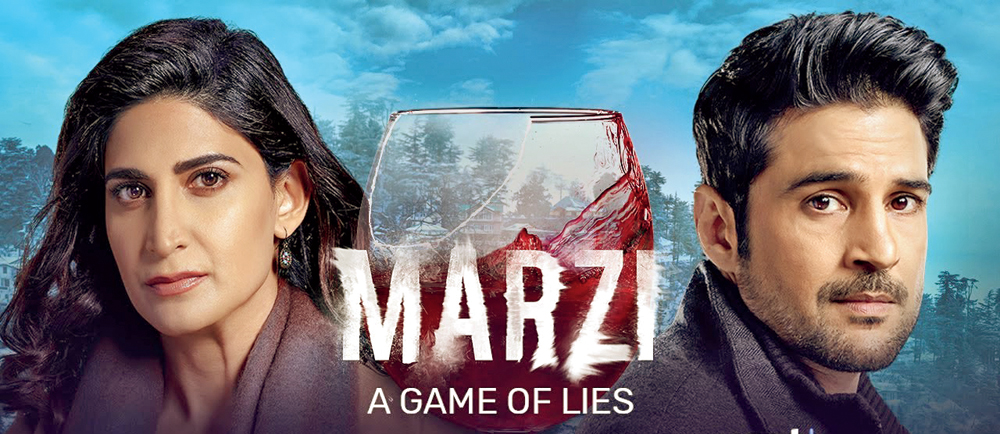They are everywhere. The nice guys. They hold open doors for you, they pull out chairs for you. They patiently listen to you repeating your childhood stories for the nth time, they are just a call away when you need someone to talk to in the middle of the night. But who are the genuinely ‘nice’ guys and who are the ones pretending to be till the time the mask drops off? Can a woman really tell? More importantly, is a woman really willing to believe that a man she believed was ‘the one’ is anything but?
Marzi, now streaming on the Voot Select app, carries forward the #MeToo narrative that we witnessed a few weeks ago in Guilty to script a ‘he versus she’ narrative about a first date gone terribly wrong. The series, playing out over eight episodes and remaining consistently watchable, succinctly touches upon pertinent issues like victim shaming, gaslighting and cognitive dissonance, in a part-relationship story, part-thriller format.
What sets Marzi apart from Guilty, and many other shows that have unfolded in the post-#MeToo-scape, is the demographic of its players. Shimla is the setting, with Sameera Chauhan (Aahana Kumra) waking up groggy at home one morning. She has a splitting headache and a sketchy recollection of events of the previous night, but the attractive 30-year-old schoolteacher is sure of one thing — she was raped by the man she had gone on a date with the night before. Anurag Saraswat (Rajeev Khandelwal) is not only the single father of Sameera’s student, but also a highly reputed and very eligible surgeon. What follows is a template common to #MeToo narratives — Sameera, for lack of evidence and with her memories of the night severely muddled, is portrayed as angsty and vindictive, while Anurag — who has a squeaky-clean background at first glance — is the voice of reason.
She screams ‘rape’, he calls it ‘consensual sex’, and before long, the two are locked in a game of thrust and parry that keeps the viewer constantly second-guessing their motivations, even as we are torn between who to believe.
The initial episodes of Marzi open out like Unbelievable, the 2019 Netflix series that presented a series of partly-fictionalised real-life rape cases, slowly but surely laying bare the emotional cost of sexual assault on survivors, especially those whose accounts and actions are doubted.
In Marzi, we watch Sameera’s life unravel bit by bit as she struggles to convince the world — sometimes even herself and her own — that she’s telling the truth, but the show’s #win lies in the fact that it’s structured in a way that makes the viewer oscillate between believing her and doubting her. #MeToo or #NotAllMen, you really can’t tell until the end of Episode 3, when the show delivers an emotional wallop and then takes on the format of a thriller. Part of it works, some bits don’t, but Marzi engages throughout.
Consent — the show is called Marzi, after all — is an important thread that holds the narrative together. A woman who invites a man home after a dinner date and then shares a few drinks with him is branded easy, and that’s the horror — oft-repeated, but hitting hard every time — that the show strives to address. A woman’s right to say “no”, no matter what the circumstances are, is negated by sniggering asides of how she “asked for it”, even as her past — Sameera’s battle with depression becomes a weapon used against her — is raked up consistently to shame and blame.
Marzi works because it uncovers not only the lies and deceit that motivate the protagonists but also those who inhabit their worlds. Everyone is driven by a selfish objective and that keeps you invested even in the other characters, including Sameera’s sister Isha (Shivani Tanksale) and Nitin (Rajeev Siddhartha), Sameera’s former boyfriend. Marzi remains watchable till such time the cat-and-mouse story — like Out of Love that was set in Coonoor, the sleepy town of Shimla contributes to Marzi’s moods and moments — is given precedence over melodrama. The Bolly treatment — revenge, kidnapping, convenient twists and turns — mars a bit of the good work but the show reins it in in the last few minutes, ending on a cliff-hanger.
Scoring with its acting — both Rajeev and Aahana bring emotion and empathy to their roles, with the former being cast against type — Marzi once again emphasises what’s true about similar #MeToo narratives: ‘hard-to-watch’ and ‘must watch’ are no longer mutually exclusive.










